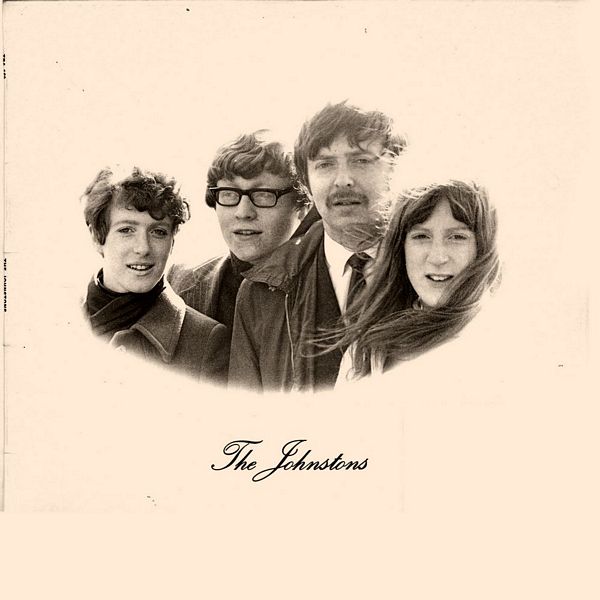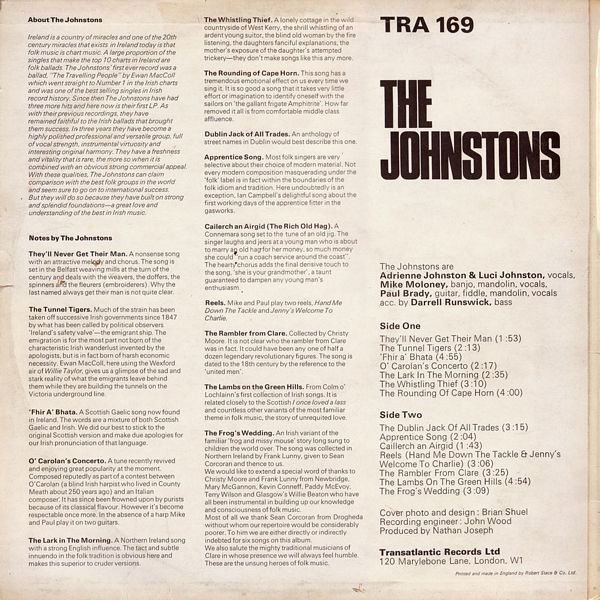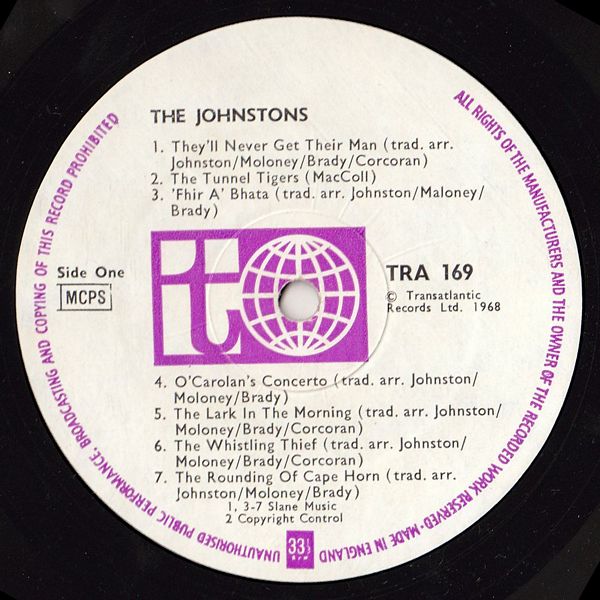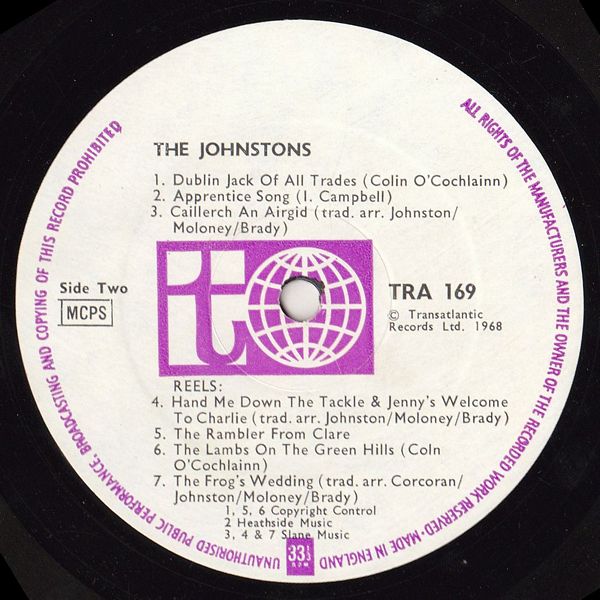

 |


 |
Sleeve Notes
About The Johnstons
Ireland is a country of miracles and one of the 20th century miracles that exists in Ireland today is that folk music is chart music. A large proportion of the singles that make the top 10 charts in Ireland are folk ballads. The Johnstons' first ever record was a ballad, "The Travelling People" by Ewan MacColl which went straight to Number 1 in the Irish charts and was one of the best selling singles in Irish record history. Since then The Johnstons have had three more hits and here now is their first LP. As with their previous recordings, they have remained faithful to the Irish ballads that brought them success. In three years they have become a highly polished professional and versatile group, full of vocal strength, instrumental virtuosity and interesting original harmony. They have a freshness and vitality that is rare, the more so when it is combined with an obvious strong commercial appeal. With these qualities. The Johnstons can claim comparison with the best folk groups m the world and seem sure to go on to international success. But they will do so because they have built on strong and splendid foundations — a great love and understanding of the best in Irish music.
Notes by The Johnstons
They'll Never Get Their Man. A nonsense song with an attractive melody and chorus. The song is set in the Belfast weaving mills at the turn of the century and deals with the weavers, the doffers, the spinners and the fleurers (embroiderers). Why the last named always get their man is not quite clear.
The Tunnel Tigers. Much of the strain has been taken off successive Irish governments since 1847 by what has been called by political observers 'Ireland's safety valve' — the emigrant ship. The emigration is for the most part not born of the characteristic Irish wanderlust invented by the apologists, but is in fact born of harsh economic necessity. Ewan MacColl, here using the Wexford air of Willie Taylor, gives us a glimpse of the sad and stark reality of what the emigrants leave behind them while they are building the tunnels on the Victoria underground line.
'Fhir A' Bhata. A Scottish Gaelic song now found in Ireland. The words are a mixture of both Scottish Gaelic and Irish. We did our best to stick to the original Scottish version and make due apologies for our Irish pronunciation of that language.
O' Carolan's Concerto. A tune recently revived and enjoying great popularity at the moment. Composed reputedly as part of a contest between O'Carolan (a blind Irish harpist who lived in County Meath about 250 years ago) and an Italian composer'. It has since been frowned upon by purists because of its classical flavour. However it's become respectable once more. In the absence of a harp Mike and Paul play it on two guitars.
The Lark in The Morning. A Northern Ireland song with a strong English influence. The tact and subtle innuendo in the folk tradition s obvious here and makes this superior to cruder versions.
The Whistling Thief. A lonely cottage in the wild countryside of West Kerry, the shrill whistling of an ardent young suitor, the blind old woman by the fire listening, the daughters fanciful explanations, the mother's exposure of the daughter's attempted trickery — they don't make songs like this any more.
The Bounding of Cape Horn. This song has a tremendous emotional effect on us every time we sing it. It is so good a song that it takes very little effort or imagination to identify oneself with the sailors on 'the gallant frigate Amphitrite'. How far removed it all is from comfortable middle class affluence.
Dublin Jack of All Trades. An anthology of street names in Dublin would best describe this one.
Apprentice Song. Most folk singers are very selective about their choice of modern material. Not every modern composition masquerading under the 'folk' label is in fact within the boundaries of the folk idiom and tradition. Here undoubtedly is an exception, Ian Campbell's delightful song about the first working days of the apprentice fitter in the gasworks.
Cailerch an Airgid (The Rich Old Hag). A Connemara song set to the tune of an old jig. The singer laughs and jeers at a young man who is about to marry an old hag for her money, so much money she could run a coach service around the coast". The hearty chorus adds the final derisive touch to the song,'she is your grandmother', a taunt guaranteed to dampen any young man's enthusiasm.
Reels. Mike and Paul play two reels. Hand Me Down The Tackle and Jenny's Welcome To Charlie.
The Rambler from Clare. Collected by Christy Moore. It is not clear who the rambler from Clare was in fact. It could have been any one of half a dozen legendary revolutionary figures. The song is dated to the 18th century by the reference to the 'united men'.
The Lambs on the Green Hills. From Colm o Lochlainn's first collection of Irish songs. It is related closely to the Scottish I once loved a lass and countless other variants of the most familiar theme in folk music, the story of unrequited love.
The Frog's Wedding. An Irish variant of the familiar 'frog and missy mouse' story long sung to children the world over. The song was collected in Northern Ireland by Frank Lunny, given to Seán Corcoran and thence to us.
We would like to extend a special word of thanks to Christy Moore and Frank Lunny from Newbridge, Mary McGannon, Kevin Conneff, Paddy McEvoy, Terry Wilson and Glasgow's Willie Beaton who have all been instrumental in building up our knowledge and consciousness of folk music.
Most of all we thank Seán Corcoran from Drogheda without whom our repertoire would be considerably poorer. To him we are either directly or indirectly indebted for six songs on this album.
We also salute the mighty traditional musicians of Clare in whose presence we will a I ways feel humble. These a re the unsung heroes of folk music.